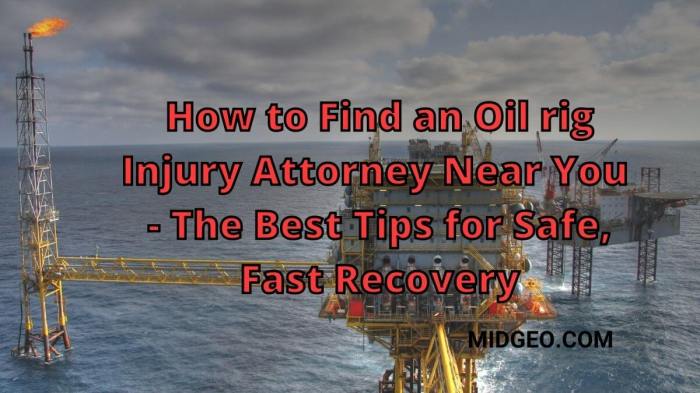Oil Rig Accident Attorneys Justice on the High Seas
Understanding Oil Rig Accidents
Oil rig accident attorneys – Oil rig accidents are devastating events, often resulting in catastrophic injuries and loss of life. The harsh and unforgiving environment, coupled with the complex machinery and high-pressure operations, creates a breeding ground for accidents. Understanding the common causes, types of injuries, and legal ramifications is crucial for those working in or affected by this industry.
Common Causes of Oil Rig Accidents
Several factors contribute to oil rig accidents. These include equipment failure due to inadequate maintenance or faulty design; human error stemming from fatigue, lack of training, or inadequate safety protocols; hazardous environmental conditions like storms or explosions; and inadequate safety procedures or negligence on the part of operators or companies.
Types of Injuries Sustained in Oil Rig Accidents
Injuries sustained in oil rig accidents range from minor cuts and bruises to severe trauma, including burns, fractures, amputations, and traumatic brain injuries. The confined and hazardous environment often exacerbates injuries, leading to complications and prolonged recovery times. Exposure to toxic substances can also lead to long-term health problems.
Examples of Negligence Leading to Oil Rig Accidents
Negligence can manifest in various forms, from inadequate safety training for workers to failure to properly maintain equipment. For example, a company’s failure to provide proper safety equipment, such as fall protection harnesses, can lead to fatal falls. Similarly, neglecting regular inspections of critical equipment can result in catastrophic failures, leading to explosions or fires.
Statistics on Oil Rig Accident Frequency and Severity
While precise statistics vary depending on the reporting methods and regions, oil rig accidents, while relatively infrequent compared to other industries, often result in severe consequences. Many incidents result in fatalities or permanent disabilities, highlighting the inherent risks associated with this line of work. Reliable data sources, such as government agencies and industry safety reports, provide insights into the frequency and severity of these accidents.
Comparison of Different Types of Oil Rig Accidents and Their Typical Causes
| Type of Accident | Typical Causes | Severity | Example |
|---|---|---|---|
| Falls | Lack of fall protection, inadequate safety railings | High, often fatal | Worker falls from a platform due to missing safety railing. |
| Explosions | Gas leaks, faulty equipment, improper handling of flammable materials | Very High, often fatal and widespread injuries | Gas leak ignites causing a fire and explosion on the rig. |
| Fires | Sparks, equipment malfunctions, lightning strikes | High, severe burns and smoke inhalation | Welding sparks ignite nearby flammable materials. |
| Equipment malfunctions | Lack of maintenance, faulty design, improper operation | Varies, can be minor or catastrophic | Crane collapses due to faulty components. |
Legal Aspects of Oil Rig Accident Claims
Navigating the legal complexities after an oil rig accident requires a thorough understanding of liability, legal procedures, and available compensation. The process can be daunting, but with the right legal representation, victims can pursue justice and fair compensation for their injuries and losses.
Legal Principles Governing Liability in Oil Rig Accidents
Liability in oil rig accidents often involves principles of negligence, strict liability, and product liability. Negligence claims focus on the failure of the employer or other parties to exercise reasonable care, leading to the accident. Strict liability holds companies responsible for inherently dangerous activities, regardless of negligence. Product liability addresses defective equipment or materials.
Process of Filing a Lawsuit After an Oil Rig Accident
Filing a lawsuit involves several steps, including gathering evidence (medical records, witness statements, accident reports), consulting with an attorney, filing a complaint with the court, engaging in discovery (exchanging information with the opposing party), and potentially going to trial.
Key Elements Required to Prove Negligence in an Oil Rig Accident Case
To prove negligence, a plaintiff must demonstrate that the defendant owed a duty of care, breached that duty, the breach caused the accident, and the plaintiff suffered damages as a result. Establishing these elements requires thorough investigation and expert testimony.
Comparison of Different Types of Compensation Available to Victims
Compensation can include medical expenses, lost wages, pain and suffering, and punitive damages (awarded to punish the defendant). The amount of compensation depends on the severity of injuries, lost earning capacity, and other factors.
Flowchart Illustrating the Steps Involved in Pursuing a Legal Claim
A flowchart would visually depict the steps, starting with the accident, then medical treatment, investigation, attorney consultation, filing a claim, discovery, settlement negotiations, and potential trial. Each step would be a box connected by arrows indicating the flow.
The Role of Oil Rig Accident Attorneys
Oil rig accident attorneys possess specialized knowledge and experience in handling complex maritime and personal injury cases. They provide crucial legal guidance and representation to victims, ensuring their rights are protected and they receive fair compensation.
Specific Expertise of Attorneys Specializing in Oil Rig Accidents
These attorneys have a deep understanding of maritime law, safety regulations, and the unique challenges associated with oil rig accidents. They are adept at investigating accidents, gathering evidence, and building strong cases.
Services Provided by Oil Rig Accident Attorneys to Their Clients
Services include legal counsel, investigation, evidence gathering, negotiation with insurance companies, litigation, and representation in court.
Examples of Successful Cases Handled by Oil Rig Accident Attorneys
While specific details of cases are often confidential, successful cases generally involve securing substantial compensation for clients, often encompassing significant medical expenses, lost wages, and pain and suffering. These cases often highlight the attorney’s ability to overcome complex legal challenges and demonstrate the severity of the negligence involved.
Information on the Attorney-Client Relationship in Such Cases
The attorney-client relationship is built on trust and confidentiality. Attorneys are obligated to protect their clients’ interests and advocate for their rights. Open communication and regular updates are essential.
List of Questions Potential Clients Should Ask Oil Rig Accident Attorneys
- Experience handling oil rig accident cases.
- Success rate in similar cases.
- Fees and payment arrangements.
- Communication style and availability.
- Resources and support staff.
Compensation and Damages

Source: midgeo.com
In oil rig accident lawsuits, victims can recover various types of damages to compensate for their losses. Understanding the different types of damages and how they are calculated is crucial for maximizing compensation.
Different Types of Damages That Can Be Recovered in an Oil Rig Accident Lawsuit
Damages include medical expenses (past, present, and future), lost wages (past, present, and future), pain and suffering, emotional distress, loss of consortium (for spouses), and punitive damages (in cases of gross negligence).
Process of Calculating Damages in These Cases
Calculating damages involves gathering detailed evidence of medical expenses, wage records, and expert testimony regarding pain and suffering and future medical needs. Economic damages are often more easily quantifiable than non-economic damages.
Examples of Successful Compensation Amounts Awarded in Similar Cases
Successful compensation amounts vary widely depending on the severity of injuries, the jurisdiction, and the specific facts of the case. Examples might include multi-million dollar settlements in cases involving catastrophic injuries or wrongful death.
Methods Used to Determine the Value of a Claim
Methods include reviewing medical records, calculating lost wages, and using expert testimony to assess pain and suffering. Settlement negotiations often consider the strength of the case, the defendant’s insurance coverage, and the potential cost of litigation.
Factors Influencing the Amount of Compensation Awarded
- Severity of injuries
- Extent of medical expenses
- Lost wages and earning capacity
- Pain and suffering
- Liability of the defendant
- Jurisdictional laws
Finding and Choosing an Attorney
Selecting the right attorney is critical for a successful outcome in an oil rig accident case. Careful consideration of an attorney’s experience, reputation, and communication style is essential.
Tips on Finding Qualified and Experienced Oil Rig Accident Attorneys
Start by searching online directories of attorneys specializing in personal injury or maritime law. Seek referrals from trusted sources, such as doctors, friends, or family. Check online reviews and ratings.
Importance of Considering an Attorney’s Track Record and Reputation
An attorney’s track record reflects their experience and success in handling similar cases. A strong reputation indicates competence, integrity, and a commitment to client success.
Process of Interviewing Potential Attorneys
Prepare a list of questions, including experience, fees, communication style, and resources. Evaluate their responsiveness, communication skills, and ability to answer your questions thoroughly and honestly.
Factors to Consider When Choosing an Attorney for an Oil Rig Accident Case
Consider experience in maritime law, success rate in similar cases, fees, communication style, availability, and the overall comfort level with the attorney.
Comparison of Different Criteria for Selecting an Attorney
| Criteria | Importance | How to Evaluate | Example |
|---|---|---|---|
| Experience | High | Review resume, case history | 10+ years specializing in maritime law |
| Reputation | High | Online reviews, referrals | Positive client testimonials |
| Communication | High | Initial consultation, responsiveness | Prompt responses to emails and calls |
| Fees | Medium | Detailed fee schedule | Contingency fee agreement |
Preventing Future Accidents: Oil Rig Accident Attorneys
Preventing oil rig accidents requires a multi-faceted approach, encompassing robust safety protocols, rigorous training, and proactive measures to mitigate risks.
Common Safety Hazards on Oil Rigs
Hazards include falls from heights, explosions, fires, equipment malfunctions, exposure to hazardous materials, and fatigue.
Preventative Measures That Can Be Implemented to Reduce the Risk of Accidents

Source: thestuffofsuccess.com
Implementing stringent safety protocols, regular equipment maintenance, providing adequate safety training, enforcing strict adherence to safety procedures, and promoting a strong safety culture are crucial.
Role of Regulatory Bodies in Ensuring Safety Standards
Regulatory bodies play a vital role in setting and enforcing safety standards, conducting inspections, and investigating accidents to identify contributing factors and prevent future incidents.
Importance of Worker Training and Safety Protocols
Comprehensive training programs are crucial to ensure workers are equipped with the necessary skills and knowledge to safely perform their duties. Clear and consistently enforced safety protocols are essential to minimize risks.
Detailed Safety Plan for an Oil Rig Operation, Including Procedures and Emergency Protocols
A comprehensive safety plan would Artikel specific procedures for all aspects of rig operation, including pre-job safety briefings, equipment inspection checklists, emergency response plans, and evacuation procedures. It would also incorporate regular safety audits and training programs to ensure continuous improvement and risk mitigation.
FAQ Compilation
How much does it cost to hire an oil rig accident attorney?
Most oil rig accident attorneys work on a contingency fee basis, meaning they only get paid if they win your case. The specific fee percentage varies by firm and case specifics.
What is the statute of limitations for oil rig accident claims?
Statutes of limitations vary by state and jurisdiction. It’s crucial to contact an attorney as soon as possible after an accident to understand the applicable deadlines.
Can I sue the oil company directly?
Yes, you can potentially sue the oil company, as well as other potentially liable parties like contractors or equipment manufacturers, depending on the circumstances of the accident and who was negligent.
What types of evidence are important in oil rig accident cases?
Essential evidence includes accident reports, witness testimonies, medical records, photographs, videos, and expert opinions on negligence and causation.





















